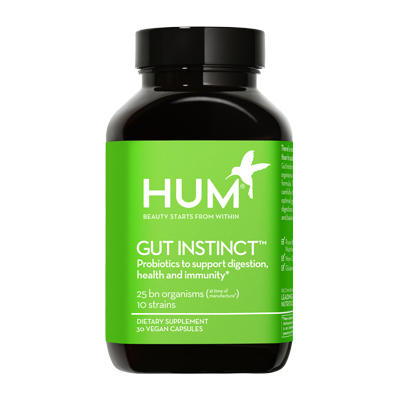Maybe you’ve heard of it. But what is leaky gut exactly? Jessica Bippen, MS, RD, breaks down this mysterious condition, offering signs of leaky gut and helpful tips to support optimal gut health.
Leaky gut isn’t the most attractive term. Despite its unappealing description, it’s gaining attention in the wellness world. The phenomenon of intestinal permeability may be associated with numerous issues including skin problems, brain fog, migraines, and fatigue. Despite a large amount of research, many Western medical professionals don’t recognize leaky gut as a “real” condition.
However, it’s not worth dismissing. While doctors don’t universally accept leaky gut as a condition, there are countless health professionals who do, and help individuals heal their intestinal tract. If you’re suffering from digestive issues and persistent symptoms without being able to pinpoint a cause, you may need to take a deeper look inside your gut.

What is Leaky Gut?
Leaky gut is defined as “increased intestinal permeability.” But what does that actually mean? In order to fully understand this condition, let’s take a closer look at the digestive tract. Your digestive system breaks down food. Once it reaches the intestinal tract, your body absorbs the nutrients. The digestive system also creates a protective barrier to ward off harmful substances, preventing them from entering the bloodstream. For that reason, it’s extra important to have a properly functioning protective barrier in the intestinal tract. The intestinal wall is lined with small gaps called tight junctions. When working properly, these spaces allow water and nutrients to pass through. They also block harmful substances from entering. Intestinal permeability (aka leaky gut) occurs when these tight junctions become loose, which allows bacteria, toxins, and not-fully-digested food particles to enter the bloodstream. The result of leaky gut is widespread inflammation in the body, immune response, and changes in gut bacteria. Such reactions may trigger numerous medical conditions and unwanted symptoms. Despite the vast amount of studies on gut permeability, the results are inconclusive. It’s difficult to perform tests that determine if this phenomenon is a symptom or underlying cause of chronic disease. Due to the lack of an absolute answer, many mainstream physicians don’t recognize leaky gut as a true medical diagnosis. But fortunately, there’s an increasing number of integrative and functional medicine doctors who support and specialize in leaky gut. They help their patients pinpoint the issues and help restore their gut back to normal.Leaky Gut Symptoms
Since every individual is unique, the symptoms of leaky gut varies from person to person, thus making diagnosis and research difficult. However, there are common signs of leaky gut that are typically triggered by an increase in inflammation and immune reaction in the body. Leaky gut symptoms may include:- Bloating
- Food sensitivities
- Fatigue
- Digestive issues
- Skin issues
- Thyroid conditions
- Joint pain
- Headaches
- Weight gain
What Causes Leaky Gut?
We know that intestinal permeability exists in certain chronic diseases. That being said, the jury is still out on whether leaky gut is the cause of any of these conditions, or if people who have leaky gut are more likely to have these health conditions. Some hypotheses suggest that individuals may have a genetic predisposition to leaky gut. Additionally, modern lifestyle factors may also link to gut inflammation. These include diets low in fiber; diets high in sugar and/or saturated fats; excessive alcohol consumption; non-steroidal anti-inflammatory drugs (NSAIDs); deficiencies in vitamins D, A, and zinc; gut imbalances; and stress.
How to Heal Your Gut
The most important thing you can do if you suspect you have leaky gut is to find a doctor who will listen. Specifically seek integrative and functional medicine doctors, many of whom are equipped to get to the root cause of your symptoms. Once you’re properly diagnosed, it’s best to work with a specialist on a treatment plan that’s personalized for your own needs. In the meantime, there are also steps you can take to improve your gut health. If possible, identify and remove the foods that cause symptoms for you. You may need to work with a doctor or dietitian who specializes in food sensitivities. If that’s not an option, the next best thing you can do for your gut health is avoiding triggers and adopting an anti-inflammatory style of eating. Try avoiding gluten, dairy, alcohol, processed foods, and certain medications (of course, with your doctor’s approval). Focus on eating a diet that’s rich in plant-based foods that are high in both fiber and antioxidants. Need inspiration? A good place to start is the Mediterranean diet plan. To further support a healthy digestive system and gut microbiome, incorporate a daily probiotic supplement. Probiotics are essential to the health of your gut since they’re a major component of the intestinal barrier. They also help regulate the digestion and absorption of nutrients in your intestinal tract. Lastly, focus on stress management. Try incorporating a meditation, yoga, or gratitude practice daily. This type of lifestyle adjustment can have a huge impact on both your mental and physical health. Stress can be liked to altered digestion, disrupted gut bacteria balance, and a weakened immune system. If your gut lining is compromised, stress could make it worse!Bottom line
Leaky gut is a real condition that’s still somewhat of a mystery. There are numerous symptoms and health conditions related to increased intestinal permeability. Despite this research, we still don’t have an answer as to what causes leaky gut, or why it’s more common in specific conditions. While the best thing you can do if you suspect you have leaky gut is to work with a doctor, you can still begin to optimize your gut health on your own. Even if you don’t end up having leaky gut, simple diet and lifestyle changes can still work wonders for your digestion and overall wellness.More like this









